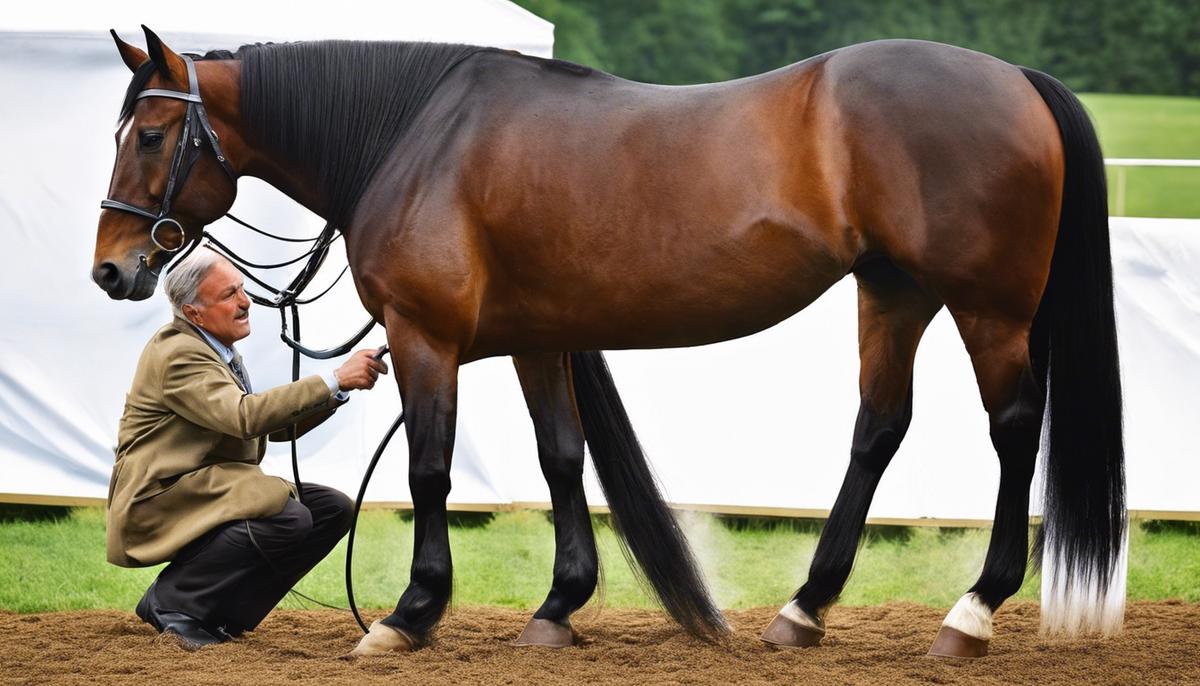Whether you’re a horse enthusiast, a professional, or someone planning on owning a Swiss horse, understanding the unique care requirements associated with this breed is critical. This study investigates the key aspects of Swiss Horse care – from the essentials of diet, grooming, and routine check-ups, to their specific physical exercise demands dictated by the alpine terrain, harsh weather conditions, and breed-specific needs. Also, we delve into the critical aspects of veterinary care, exploring common health issues, diagnosis, preventive measures, and treatment specific to Swiss horses. By understanding these factors, we are then poised to provide the best possible care to these majestic creatures and ensure their health, happiness, and longevity.
Table of Contents (Horspedia)
Basic Essentials in Swiss Horse Care
Key Fundamentals In Quieting the Neighs: Taking Care of a Swiss Horse
There is a kind of bond between thought and rider that is incomparable, especially when it comes to caring for a Swiss horse. These majestic creatures need more than just an occasional carrot and a scrub down after a long ride. Proper care and attention are critical to their health, happiness, and overall performance.
Firstly, it’s vital to understand that Swiss horses, like any other horse, thrive on routine. Whether it’s feeding, grooming, or exercising, maintaining consistency is key to their health and wellbeing. It’s not just about the horse either – a structured routine is helpful for the caretaker as well, ensuring all tasks are completed diligently.
Secondly, appropriate diet is essential. Swiss horses do exceptionally well on a forage-based diet with the right proportions of hay, grass, grains, and clean water. Depending on their work load, they may also need cooked cereal or concentrate. Each horse is unique, so a bespoke diet plan should be discussed with a vet or equine nutritionist.
But it’s not just what the horse is eating, it’s also important to ensure they are eating regularly with typical feeding times at dawn and dusk. Adhering to this natural feeding cycle can help meet their body’s metabolic needs. Mindful feeding also includes checking teeth regularly for sharp edges, ensuring optimal consumption and digestion.
Equine health care is another critical aspect. Regular physical check-ups, deworming, vaccinations, and hoof care are just as important as food and exercise. Most Swiss horses live outdoors, so monitoring their condition, looking out for anything unusual or abnormal is crucial.
Then there is the matter of grooming – an integral part of taking care of any horse, Swiss horses included. Regular brushing not only keeps their coat in prime condition but also works as a great bonding time. It’s also an excellent way to check for lumps, bumps or any other irregularities in their body.
Exercise is unquestionably essential for a Swiss horse’s health and happiness. Being Natural athletes, they require regular workouts to maintain a fit and healthy body. A suitable exercise routine might include a combination of riding, free lunging, hacking, and grazing.
Housing and stable management are also fundamental in Swiss horse care. The horse should have a clean, dry place to live, whether it’s a stable or a field. A well-kept environment eliminates the risk of diseases and infection. The space should be large enough for the horse to move comfortably and have good air circulation.
And finally, companionship is of great importance. Horses are herd animals and enjoy the company of others. If it’s not possible to keep more than one horse, consider adding a companion animal like a goat or a donkey.
Caring for a Swiss horse is not just about fulfilling their basic needs, but also about fostering a deep bond of trust and understanding. Horses are incredibly intuitive and can sense their owner’s mood and energy, so maintaining a calm and confident aura is necessary. It’s a rewarding job that demands dedication, commitment, and love. Take it from any Swiss horse owners out there, the rewards are worth the effort!

Delving into Nutritional Requirements of Swiss Horses
A Deep Dive into Swiss Horse Nutrition: Essential Aspects to Fathom
Just as a well-rounded diet is crucial to human health, nutritional well-being is pivotal for our equine friends too, specifically Swiss horses. Proper nutrition not only ensures optimal health but also affects a horse’s performance, reproduction, and longevity.
Let’s delve into the intricacies of Swiss horse nutrition, focusing on the significant nutrients and how to accommodate their unique dietary demands.
Understanding Nutritional Essentials for Swiss Horses
Starting with forages, the backbone of a Swiss horse’s diet, they deliver the required fiber crucial for gut health. Alfalfa, clover, and mixed grass hays are excellent choices that provide much-needed vitamins, minerals, and proteins. However, this doesn’t absolve the need for supplementation or concentrate feed, especially in performance horses or those with specific dietary needs.
Next comes water, the unsung hero and an essential ingredient in a Swiss horse’s diet, especially considering their considerable water consumption – varying from 5 to 15 gallons daily. This requirement increases significantly with exercise, warm weather, or lactation. Thus, ensuring unrestricted access to clean, palatable water is paramount.
Equally important for Swiss horses are carbohydrates, supplying horses with the necessary energy to maintain routine tasks and performances. Cereals like oats, barley, and corn have a higher starch content that, when processed correctly, horses can efficiently utilize. Still, moderation is key as excessive intake might lead to metabolic disorders such as laminitis or colic.
Swiss horses, particularly performing ones, require more proteins to support muscle development and repair. In this regard, legumes like soybeans and lupines can offer an elevated protein level. On the other hand, fats, though not a traditional part of horse diets, seem to be gaining favor owing to their dense energy content. They can be a useful addition for horses requiring additional calorie intake while keeping the bulk of the consumed feed down.
Ensuring appropriate mineral intake is vital in supporting various bodily functions, including bone and cellular health, coat condition, performance, and reproduction. These minerals include sodium, calcium, phosphorus, and others. Also, vitamins, especially those not produced by horses internally – like vitamin C, E, and certain B-vitamins, should be considered in a Swiss horse’s diet.
Considerations for Feeding Practices
Feeding practices go beyond simply delivering the required nutrition. It’s all about understanding the nutritional content of feed and providing ration adjustments when necessary.
When it comes to feeding Swiss horses, slow feeders can be a nifty tool. These devices mimic the natural grazing behavior, encourage slower intake, reducing the likelihood of digestive upset, and keep horses content between meals.
Lastly, individuality is key. Each horse is different, having unique dietary needs depending on their age, lifestyle, physiological state, and work level. A lactating mare’s nutritional requirement won’t be the same as a growing foal or an aging horse. Thus, rations must be adjusted accordingly and monitored regularly, involving professional services, like equine nutritionists and veterinarians, if needed.
Feeding Swiss horses might seem like a complex task, but with careful consideration of their nutritional needs and appropriate feeding practices, it is a journey that will lead to a healthier, happier horse, putting wind beneath the wings of equestrian enthusiasts.

Swiss Horses’ Training and Exercise
Diving straight into the heart of this article, it’s crucial to understand how a proper exercise regimen for Swiss horses involves a combination of strength, endurance, and speed. Remember, the benefit of these exercises largely depends on their systematic implementation. It begins with a gradual intensity increase, which should be adjusted according to the horse’s performance status and physical capabilities.
The starting point of any exercise regimen for Swiss horses should be a dynamic warm-up. This includes light jogging on soft ground for about 15-20 minutes. It aids in lubricating the hock and fetlock joints, reducing the risk of sprains and strains, and gradually increasing heart and respiratory rates, thereby preparing the body for more rigorous activities.
Next, strengthens the horse’s muscles and tendons by introducing hill work into the regimen. Having the horse work against gravity builds up strength, much like resistance training in humans. Start with small, gradual slopes eventually moving to steeper inclines. This enhances both their rear and front end strength, fostering more power and stability.
Endurance training is another critical element for Swiss horses, particularly for those involved in eventing or long-distance riding. Long slow distance (LSD) training is an excellent method for building endurance. It involves low-intensity workouts over extended periods and distances. A high-endurance horse should be able to comfortably trot for 45-60 minutes.
Timing is also critical in developing a suitable regimen. Training sessions should ideally be scheduled during the cooler parts of the day, avoiding extreme temperatures to prevent dehydration and fatigue.
Agility and speed training are also essential for performance horses. This is accomplished through interval training, consisting of periods of high-intensity work followed by periods of low-intensity work or rest. Incorporate sets of canter and gallop interspersed with trotting sets to build speed and agility.
Last but not least, flexibility jumps should not be underappreciated. Pole work and grid work can significantly improve a Swiss horse’s agility, spatial awareness, and coordination. It’s a low-impact activity that benefits horses of all ages and training levels.
Above all, knowing the horse’s physical limits and signs of stress is crucial. Overtraining can lead to both physical and psychological distress in horses. Muscle soreness, decreased appetite, mood changes, and persistent fatigue are signs that training intensity should be dialed back.
Likewise, periodically, professionals in equine sports medicine should assess the horse’s condition. These professionals can evaluate the horse’s heart rate, respiratory rate, and overall fitness and help fine-tune the exercise regimen. They can also detect any signs of overtraining and injury early on, promoting a long, active, and healthy life for the Swiss horse.
Just as each horse is unique, so should be their training regimen. Tailored to fit each horse’s performance level, physical abilities, and purpose – competitive or leisure, the nuances of training a Swiss Horse can indeed be a complex yet rewarding endeavor. So grab that bridle, feel the surge of excitement, and embark on this empowering journey of sculpting your Swiss horse into a picture of health, power, and grace.

Veterinary Care and Common Health Issues in Swiss Horses
With all of our faithful steeds receiving the best in care, it’s time to gallop to the next topic of discussion: Common health problems Swiss horses face and how regular veterinary care contributes to their well-being, a topic that doesn’t always trot into everyday equestrian talk, but one that is essential to the longevity and happiness of our equine companions.
Given the robust nature of Swiss horses, it’s imperative to understand certain common health issues that they tend to face. Colic, for one, is a breed predisposition that implies digestion issues leading to severe abdominal discomfort. Early detection, possible with regular veterinarian check-ups, often dodges serious health problems while ensuring the horse’s comfort.
Laminitis, another common Swiss horse health hiccup, results from inflammation of the soft tissue in the hoof. Severe cases could cause permanent damage, but under the watchful eyes of a dedicated horse owner and a licensed veterinarian, it is absolutely manageable through specialized care and proper nutrition.
Let’s not forget Equine Metabolic Syndrome (EMS), a health complication often marked by obesity, insulin resistance, or even laminitis. Healthy dietary management, routine exercise (tailored to the specific horse’s needs), and of course, regular veterinary care can effectively mitigate and manage EMS, allowing our equine friends to trod on happily!
Speaking of skilled veterinarians, theirs is an invaluable contribution to a horse’s wellbeing. Using their precise diagnostic abilities and comprehensive understanding of equine health, they are in an unbeatable position to identify health aberrations early, providing necessary treatment in a timely manner.
Furthermore, regular vaccination is the paragon of preventative care offered by the vets. From equine encephalomyelitis and West Nile Virus to Rabies and Tetanus, vaccination shields the horse from potentially life-threatening diseases.
Equine dental care, provided by veterinarians, is nothing short of significant to the animals’ health. Routine dental check-ups can catch issues like sharp enamel points, hooks, and wave mouth early. After all, prevention beats cure, right?
Every horse, regardless of breed, benefits from regular blood tests. They give an unparalleled insight into the horse’s internal workings, revealing nutritional deficiencies, diseases, or the aftereffects of an illness, aiding in a more personalized care approach for your Swiss horse.
But there’s more! Even the common skin conditions, parasites, or fungi which many horses encounter can be nipped in the bud with a veterinarian’s expertise and targeted treatment.
Unquestionably, regular veterinary care is instrumental in ensuring a Swiss horse’s longevity, performance, and overall well-being, providing early detection, nutrition advice, preventative measures, and curative treatment when necessary. Through its implementation, we could keep our horses not just surviving, but truly thriving.
After all, with each budding sunrise, there’s a galloping willingness in the hearts of horse owners to provide the best for their hoofed companions. And indeed, it’s this very ardent spirit that contributes to a bond unlike any other. Now, go hug a horse!

Understanding and becoming skilled in Swiss horse care is not something achieved overnight. It requires detailed knowledge and practical application of that knowledge in areas like nutrition, physical training, and medical care. Nurturing the health and performance of a Swiss horse is a rewarding experience, and it begins by understanding the distinct requirements of this mountain horse breed. Armed with this knowledge, Swiss horse care can become one of the most gratifying experiences, allowing us to cultivate a deeper bond with these amazing creatures, and ensuring their well-being for years to come.

